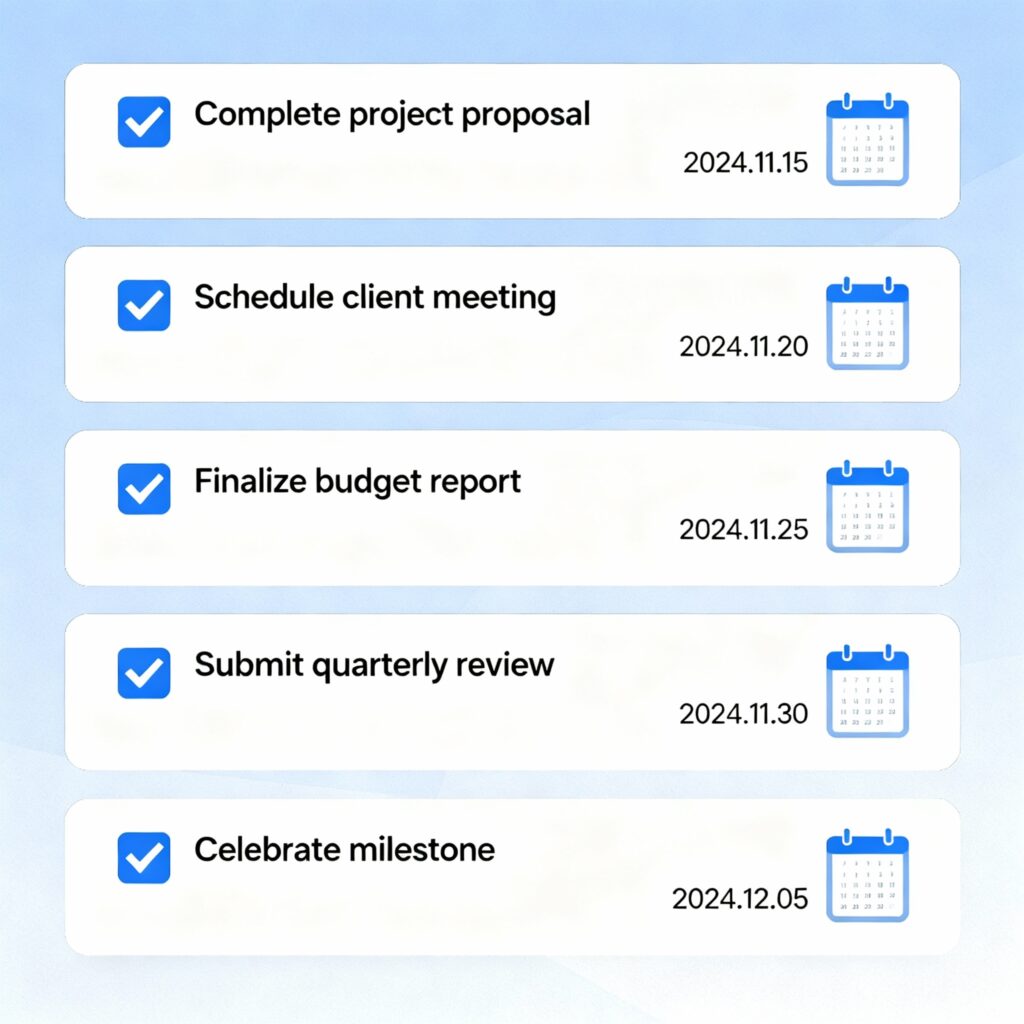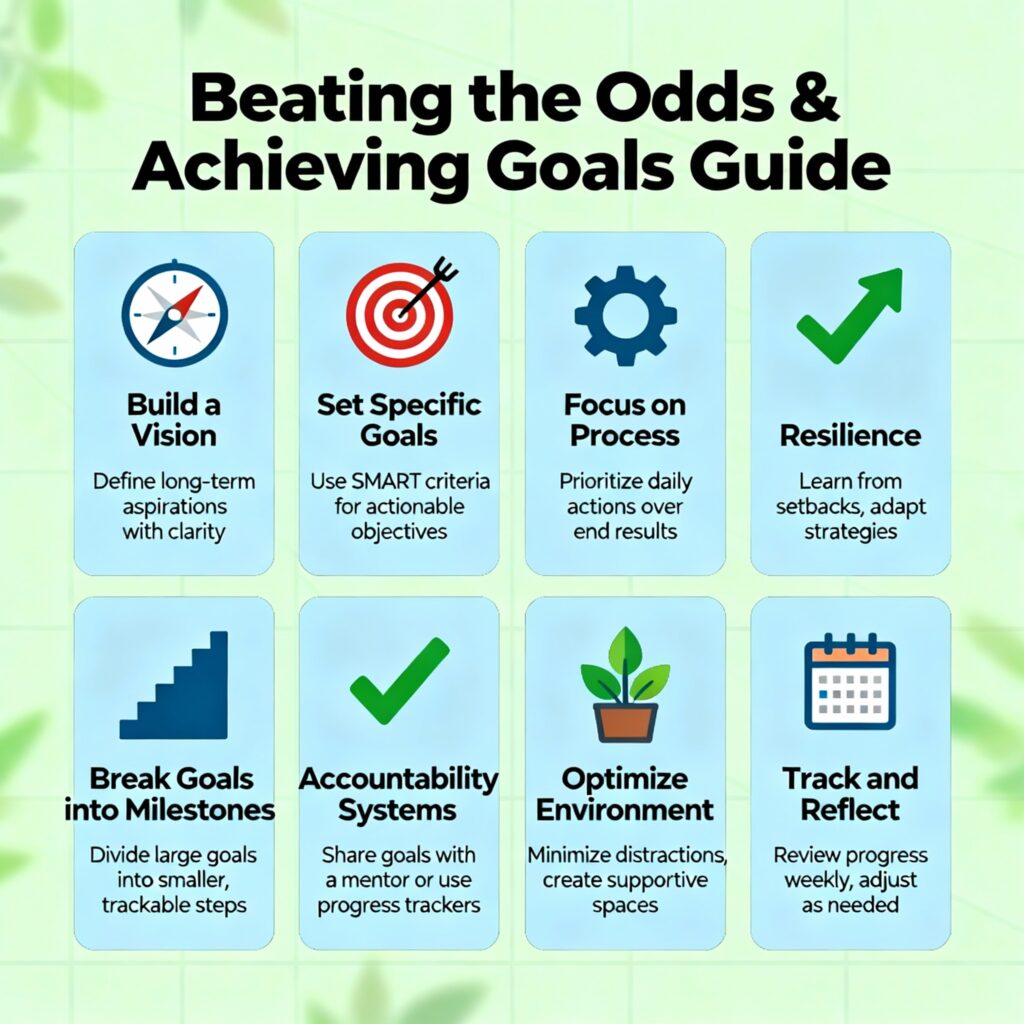In our previous post, we explored why people fail to achieve their goals—from unclear intentions and lack of vision to poor resilience and distractions. Understanding these pitfalls is the first step, but awareness alone isn’t enough. To truly make progress, you need a roadmap for success.
This article is your next step forward. Instead of focusing on why goals collapse, we’ll dive into proven strategies to beat the odds and actually achieve goals. Whether you’re chasing personal milestones or career breakthroughs, these methods will help you build momentum, stay resilient, and turn ambition into lasting achievement.
Why Most People Struggle with Goals
Before we dive into solutions, it’s important to understand the problem. A companion post explains in detail why people fail to achieve their goals. To summarize:
- They don’t set specific and measurable goals.
- They ignore the importance of process goals (focusing only on outcomes).
- They lack a clear vision of where the goal fits into their bigger life purpose.
- They underestimate the role of resilience in bouncing back after failure.
- They don’t build an environment of accountability and support.
Now, let’s flip the script and talk about proven ways you can achieve goals and sustain momentum.
Build a Vision That Inspires You 🌅

Think about times when achieving goals didn’t felt anything meaningful. It didn’t make sense in real terms. Because those goals were not linked to any vision. A vision that gives a purpose to you. A vision that adds meaning to you. Take Elon Musk’s example—his vision isn’t just “build rockets,” but “make life multiplanetary.”
Ask yourself:
- Why does this goal matter to me?
- How does it connect to the kind of person I want to become?
Research shows people with a strong sense of purpose are more likely to persevere and achieve goals despite obstacles.
Set Clear and Specific Goals 🎯

Imagine telling your GPS: “Take me somewhere nice.” Useless, right? Similarly, vague goals like “get healthier” don’t give your brain a roadmap.
Instead, follow SMART principle—Specific, Measurable, Achievable, Relevant, and Time-bound. For instance:
- “Lose 5 kilos in 3 months by exercising 4 times a week.”
- “Write 2 blog posts every month for 6 months.”
A study by Dr. Gail Matthews at Dominican University in California that writing down goals suggest a 42% higher chance of achieving goals when written down. So, commit your goals through writing.
Focus on Process, Not Outcomes 🔄

Too often, people obsess over the final result—weight lost, revenue earned, promotion won. But success is built on consistent actions. These are called process goals.
Example:
- Instead of focusing only on “running a marathon,” make it your process goal to “run 4 days a week, starting with 3 km and increasing gradually.”
- Instead of “get promoted,” focus on “deliver one measurable improvement project per quarter.”
By celebrating small wins, you reinforce motivation and create a feedback loop that pushes you forward.
Cultivate Resilience 💪

Resilience is the ability to bounce back when things don’t go as planned.
Practical ways to build resilience:
- See setbacks as feedback, not final outcomes.
- Use reframing techniques—replace “I failed” with “I learned.”
- Maintain routines that support mental health (sleep, exercise, mindfulness).
When resilience becomes a habit, you won’t give up after the first hurdle—you’ll adapt and push forward.
Break Down Big Goals into Milestones 🧩

Psychologists call this “chunking.” Large goals feel overwhelming, but when broken into smaller parts, they become manageable.
For example, instead of “write a book,” focus on:
- Week 1: Outline chapters.
- Weeks 2–4: Write 500 words daily.
- Month 2: Revise first draft.
This approach keeps you motivated, and every milestone achieved provides a confidence boost to continue.
Create Accountability Systems 🧑🤝🧑

Ever noticed it’s easier to stick to a gym routine when you have a workout buddy? That’s accountability in action to help you achieve goals.
Ways to build accountability:
- Share your goals with a trusted colleague or friend.
- Join mastermind groups or professional communities.
- Use apps like StickK or Beeminder, where failing your goal costs you money.
Accountability not only increases consistency but also brings in external support and encouragement.
Optimize Your Environment 🌿

Your environment can either work for you or against you. If your phone keeps buzzing with notifications, your focus will scatter.
Tips:
- Remove distractions: Keep your phone out of reach during deep work.
- Add cues: Place your running shoes by the door as a reminder.
- Surround yourself with like-minded people striving to achieve goals.
As James Clear explains in Atomic Habits, shaping your environment often works better than relying on sheer willpower (source).
Keep Track and Reflect Regularly 📊

Measurement is motivation. Regular check-ins help you see progress and adjust strategies.
Simple methods:
- Maintain a weekly review journal.
- Use project management tools like Trello, Notion, or Asana.
- Reflect monthly: What worked? What needs change?
Tracking not only improves self-awareness but also prevents you from drifting off course.
From Vision to Action: A Practical Goal-Setting Template
To help you move from ideas to execution, here’s a simple long-term to short-term goal-setting framework you can start using right away.
| Goal Category | Long-Term Goal (5+ Years) | Mid-Term Goal (1–5 Years) | Short-Term Goal (0–12 Months) | Action Steps | Deadline | Progress % | Notes |
|---|---|---|---|---|---|---|---|
| Career | Become a senior manager | Get promoted to team lead | Complete leadership course | Enroll in online course, seek mentorship | 2025-12-31 | 0 | Start with 1 course this quarter |
| Health | Maintain ideal body weight | Lose 10 kg in 3 years | Lose 3 kg in 6 months | Daily walk, reduce sugar intake | 2025-06-30 | 0 | Track progress weekly |
| Finance | Achieve financial independence | Save ₹20L in 3 years | Save ₹5L in 12 months | Automate monthly SIPs, reduce expenses | 2025-12-31 | 0 | Review savings monthly |
For career-oriented goals, check resources below:
For further reads,
The Science & Psychology of Goal-Setting 101 — a psychology-focused article summarizing key research and principles behind goal setting.





Leave a Reply